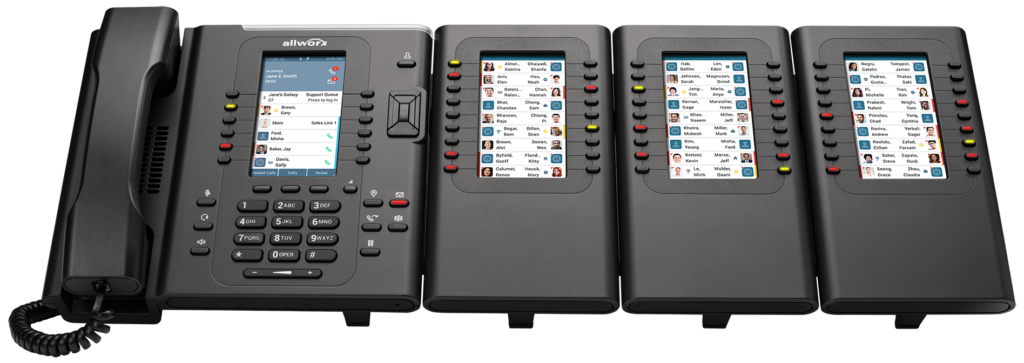By Mary Grlic
As with any business, having a reliable IT service is an essential for nonprofit organizations. For a lot of nonprofits, having good means of communication is one of the most important parts of operation. This means the right type of phone system for your nonprofit – but what exactly is the right choice? VoIP is the perfect phone setup for any type of business, especially nonprofits (or non-governmental organizations, NGOs) because of its flexibility, expandability, cost effectiveness, and so much more. Ease of communication is essential for nonprofits. With VoIP, your organization can always be sure that you are accessible and connected. Setting up VoIP doesn’t have to be hassle either. Let’s look into what VoIP is and how it can be the perfect solution for any nonprofit.
VoIP for Non-Profits

VoIP stands for Voice over Internet Protocol. VoIP allows for people to make and receive calls over internet connection instead of wired systems and landlines. If you have high-speed internet and a proper service provider, you can easily make and receive calls with VoIP. Voice over internet protocol has a bunch of key features that are essential for any business, especially nonprofit organizations.
When you hear the term nonprofit, you might think of a call center where agents help callers or collect donations. This means lots of phones for many different people, with the need to hand off calls or use other key VoIP features. This is exactly the sort of situation where a good VoIP phone system would come in handy.
What might a VoIP network look like?
One of the most important parts of your VoIP system is a reliable internet connection. Since VoIP runs via the internet, a stable connection is essential so there is minimal interference. A voice over IP network can support a large amount of phones, which can offer a variety of features, depending on company needs. Depending on the size of your network, the number of phones and users will vary. Your organization should consider all of its wants and needs before setting up a VoIP network. Additionally, research the different types of VoIP networks, including hosted and on-premises VoIP, and compare costs accordingly. There are a lot of features that are customizable for different organizations.
Hardware wise, a phone network requires the phones themselves, a router for internet connection, ethernet, and cables. With a good managed IT service organization, VoIP setup is easy – which is exactly what your nonprofit needs.
Having a Trustworthy Communication Network

Nonprofits need strong communication methods to ensure that they can fulfill their mission. VoIP allows users make voice calls using internet connection instead of a regular analog phone line. Older copper wire phone lines are quickly becoming obsolete, especially for phone carriers and new methods of communication. VoIP systems rely on the internet to send connections to voice data. Voice over IP is an extremely reliable form of communication because of the way information gets exchanged and supported. Additionally, there are very few limitations as to where you can send or receive calls. For example, features like call forwarding allow you to “forward” incoming calls to your cell phone. This way, you can be accessible from anywhere. Having a good network connection is essential for nonprofit organizations. With VoIP and a good network connection, employees do not have to worry so much about poor connectivity during calls.
Expandability and Potential to Grow
VoIP is an excellent option for nonprofits because of the ease to add more devices and upgrade as your organization grows. If your nonprofit is starting off small, there is no need to worry about the day you need more phones or need to expand your network, because with VoIP, there is minimal hassle. A single server can generally host up to 250 phones, and as little as 5 or 10 phones. So if you expect your nonprofit to grow in the near future, there is no need to worry about expanding with a VoIP system.
Geographic Flexibility
Many nonprofit organizations operate or need to have flexibility to make/receive calls over long distances. The demographic flexibility that comes with VoIP is one of the most compelling features.
VoIP Features
So what makes VoIP so special, especially for NGOs? What benefits does it offer that other phone systems do not have, and how can this help a nonprofit organization be more productive and successful? Here are some key features of VoIP:
Call queue
One of the best VoIP features for businesses, and nonprofit organizations alike, is the calling queue. The “queue” places incoming calls in an answering line while your team is busy with other calls. This way, callers won’t be sent straight to voicemail or have to call back if representatives are busy. For a nonprofit, this is especially useful to ensure that all calls are received and taken care of.
ACD (Automatic Call Distribution)

Automatic call distribution is an especially great feature for nonprofit organizations. Imagine a huge call center with a lot of different employees taking a bunch of incoming calls. The automatic call distribution evenly distributes calls to employees. With phone systems like AllWorx, there are four different types of call distribution styles: linear priority, round-robin, longest idle, and ring all. Nonprofit organizations may choose to use the round-robin style, for example, which distributes calls in a circular manner, starting with one person and then going to the next. If that person is busy, the call will go to the next person in that circle. In a situation where there are a lot of inbound calls, as a nonprofit may experience, having ACD is a great way to make sure all calls are received.
Call forwarding/routes
With VoIP, users can actually program their devices so that they receive calls to another device if they are not available or not in the office. Additionally, there is so much flexibility with VoIP that allows employees to work from just about anywhere and still receive and make calls. As long as users have internet access, they can make calls with VoIP. Call forwarding makes hybrid and remote work even easier, and for nonprofits, this is great to allow employees to work from anywhere and still stay productive. Some nonprofit organizations may require a 24/7 response rate, depending on the nature of their work mission. Call forwarding is a great way to make sure essential messages are always received.
Auto-attendant
With auto attendant, calls can be answered automatically and give users a menu with options to pick from. They can be directed to a particular department, voicemail, operator, etc.
VoIP offers a lot of features that can be beneficial for any business, especially nonprofit organizations.
You’re a non-for-profit organization: Cost effective productivity with VoIP
Charitable organizations don’t collect money from sales, since they are not working for profit. That makes budgeting a bit of a challenge. Your phone system, though, is not something that should be overlooked when it comes to effectively managing your business costs. Having a VoIP phone is a very cost effective option for many businesses. Nonprofits and NGOs especially may run on a tight budget, considering the nature of their organization. It’s critical to have a reliable phone system that will enable effective communication while still maintaining low costs. VoIP will allow nonprofits to achieve their mission without having to worry about the high costs of a phone system. A typical landline phone is more expensive than VoIP, and gets even more costly with simple features like voicemail and caller ID. VoIP will allow you to have these features and more for a lower cost.
Computero Specializes in VoIP Phone Systems for Nonprofits

With our IT services for nonprofits, Computero has helped an array of NGOs set up their VoIP phone systems and network for effective communication. This includes all the necessary parts of your phone system, such as the phones themselves, wiring, ethernet, and cloud-based set up. We work with many small and medium businesses to set up and maintain their VoIP systems. At Computero, we trust AllWorx for our VoIP configuration. AllWorx can support anywhere from 5 to 250 users on one server, making it a great option for expandability and businesses of any size. Even if your employees are working remotely or from farther areas, they can still use Allworx. They offer many of the features outlined above, and overall, are an excellent choice for any nonprofit organization.





